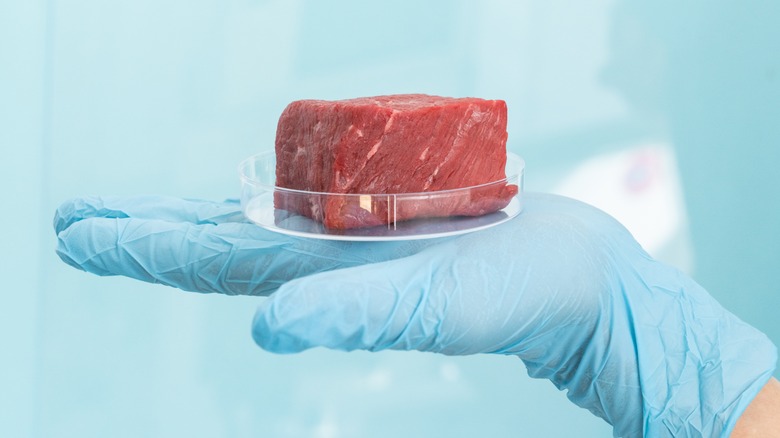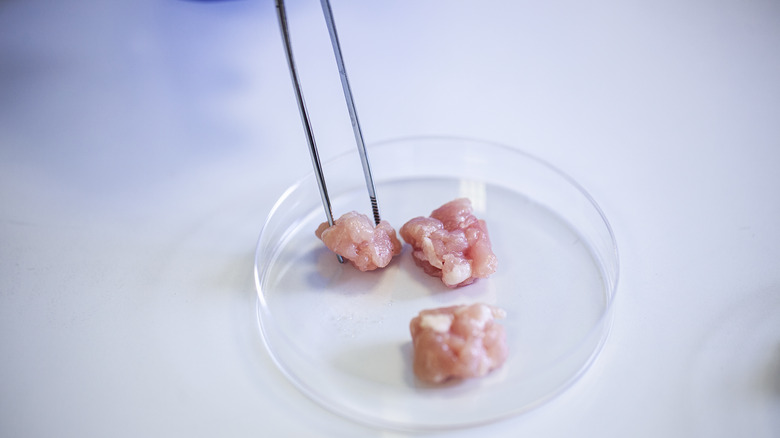Why Some States Are Banning Lab-Grown Meat
Lab-grown meat is protein made from animal cells that's been cultured in labs. The food source has many proponents, but it's not yet for sale in the U.S., and Florida and several other states are trying to keep it that way. Florida legislators have passed a bill to ban lab-grown meat, and lawmakers in Alabama, Arizona, and Tennessee are trying to pass similar prohibitions.
While Florida Governor Ron DeSantis has yet to sign the bill and make it law, he's indicated a willingness to do so, based on previous comments condemning so-called "fake meats." If he signs it, the bill would officially halt the manufacture and sale of cell-cultivated meats in the state, with civil or criminal penalties for those in violation.
Florida legislators have given several different reasons for pushing for the bill, citing, among other things, the lack of long-term studies on the effects of these meats, and the fact that lab-grown meat represents an ethical concern and could eventually lead to outright cloning. Protection of the state's cattle and farming industries has also been put forth as a reason.
Florida's cultivated meat ban is the closest to passing. In Alabama, state legislators passed a bill in the state Senate but it still needs approval from the House of Representatives. The Tennessee and Arizona bans likewise have hurdles to clear in the legislative process. Texas, however, has officially passed a law affecting how lab-grown meat like beef or chicken will be labeled in grocery stores.
There are some in favor of cell-cultivated meat production
The argument for cell-cultivated meats is that it tastes just like farmed meat, and could prevent the slaughter of countless animals. It's also much more sustainable, with a lower carbon footprint than traditional beef and poultry. Meat, for example, along with dairy, is a significant contributor to the emission of greenhouse gases, accounting for 14.5%.
It also bears noting that producers of lab-grown meats aren't trying to replace conventional meats but to offer another option as demand for these proteins continues to rise. To date, however, only two of the 43 U.S.-based cell-cultivated companies — a fraction of the 150 estimated worldwide — have received the go-ahead from the FDA to sell their products, and none have reached the market as of yet, except in select restaurants. Chef Marcus Samuelsson, for example, has committed to serving lab-grown steaks.
Despite the pushback from some lawmakers, interest in the nascent industry is high, as proven by the $3 billion that has been invested thus far. A major beef and poultry company, Tyson, has invested in lab-cultured meat, and so, too, have Richard Branson, Bill Gates, and Elon Musk. The latter worked with an Israeli company to study the cultivation of meat on a SpaceX flight from Florida. Such experimentation would still be legal under the new Florida bill, by the way, due to an amendment that seeks to protect the state's space industry.
The potential criminal penalties if these laws pass
Lawmakers in some states aren't just actively pushing to ban lab-grown meat; they're also seeking to impose heavy penalties on offenders. Florida, the state at the forefront of the movement, is eyeing a $1,000 fine for companies convicted of making or selling products that violate the not yet signed law. West Virginia and Tennessee, by contrast, are considering much stiffer fines, up to $100,000 and $1,000,000, respectively. Alabama, meanwhile, wants those convicted to face lengthy prison terms of up to 10 years.
Such penalties are unlikely to deter cell-cultivated meat producers from continuing to try to scale up manufacturing. However, it may prompt some companies to consider more welcoming environments outside the U.S. The Netherlands, for example, pioneered the development of lab-grown meat in 2013 and continues to support the industry. Israel, home to Aleph Farms, a partner of both Elon Musk and Marcus Samuelsson, is also receptive to the idea, as is South Korea. But China is the country most invested in the new technology, allocating $600 million in funding for research, and committing to plant-based and lab-cultivated meats as part of its plans for maintaining food security.
As a result of this global interest in alternative proteins, lab-grown meat is expected to account for 35% of all meat sold worldwide by 2040, even if a few states are successful in banning it.



